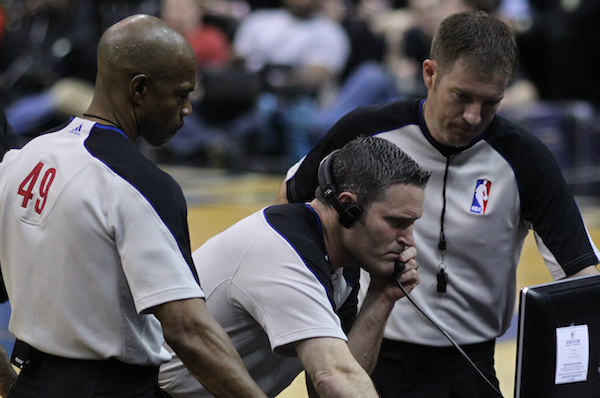Dear Sports Fan,
Reading about the bad call in the Pittsburgh/Atlanta game last night reminded me of something I’ve always wondered. Whether it’s because the ref is looking the other way (literally or figuratively), or because of just plain human error, the rules in sports are often either not enforced, or not enforced correctly. But in many cases, it seems like people just consider that an integral part of the game! Especially given the increasing ability of technology to settle disputes, why not just come up with what the real rules ought to be, and then enforce them as thoroughly as possible?
Thanks,
Erik
— — —
(This is a continuation of an answer to this question. The first half was posted here.)
It will ruin the game:
There is some concern that adding technology to sports will ruin the game by making it too sterile or too slow. Taking the humanity out of the game could be a concern, but as much as people love discussing disputed calls at the water cooler, they also love talking about great (and terrible) performances, and great (and terrible) decisions on the part of the players and coaches. There will always be something to talk about. As for making the game too slow… uh… it could not possibly slow down the game as much as television time-outs, arguing with refs about calls, or in the case of baseball… adjusting your batting gloves, hat, glove, or cup compulsively over and over and over again.
It’s too expensive:
FIFA, the notoriously frustrating international federation of soccer refuses to add video replay to international competition because it would be too expensive for some of its member nations to implement. This is a curious reason since it seems like knowing ahead of time that you will actually know whether the ball crossed the goal line during the game shouldn’t change any element of tactics or strategy.
What do you mean “right?”
This is the heart of the answer to your question. A rule says, “it’s against the rules to trip an opponent” but does that mean “it’s against the rules to trip an opponent” or “it’s against the rules to trip an opponent if you get caught?” It’s clear from these two sports cliches which way the sports world leans: “it’s not a foul if you don’t get caught” and “if you’re not cheating, you’re not trying.”
Sports, particularly baseball is all about cheating. The last twenty years have been shaped by steroids and HGH. Before that there were amphetamines called greenies. Before that teams regularly intimidated officials or just plain assaulted them when they didn’t like the calls they were getting. It’s well know that the 1919 World Series was fixed by a few players on the White Sox and there have always been unproven rumors that the 1918 one might have been fixed as well. Cyclists are jam-packed full of drugs. They have been for a long time but “tiny electric motors…?” That’s a new one.
Even if a player is clean when he steps onto the court, he or she is rarely clean by the end of the game. Some of the most memorable plays in sports history have been the beneficiaries of some incorrect or missed calls. In soccer there is the “hand of god” goal, in basketball, Michael Jordan’s famous shot to beat the Utah Jazz is an offensive foul. Watch the video and notice Jordan’s left hand on his defender’s hip… he definitely pushes off.
Jordan is not great in spite of pushing off, he’s great partially because he pushed off and didn’t get caught.
Another way to state the question is — do we really want to have the game called “perfectly?” Here’s an example of this in the non-sports world. We certainly have the technology to identify each car and driver and what road they are on. Why shouldn’t we simply fine people whenever they go over the speed limit? Why waste all the time, money, and talent of our police departments lurking around trying to catch people when we could just automate it? I know we’ve started doing this with running some red lights, but I think that if we tried to automate speeding tickets on a large scale there would be riots and political parties would shape up around the issue… and I’m not sure which would be worse! It’s the same with most sports — a totally policed game is a boring one.
Thanks for the fun question,
Ezra Fischer

